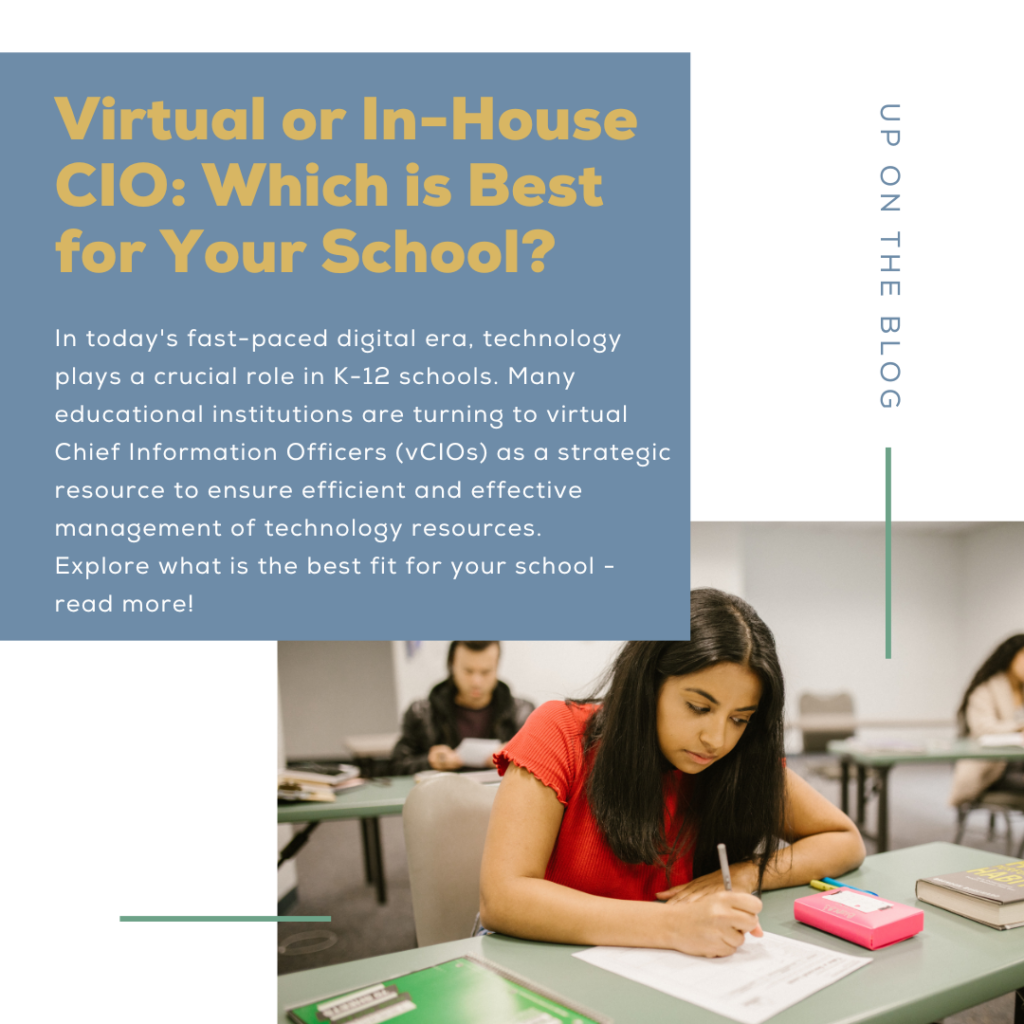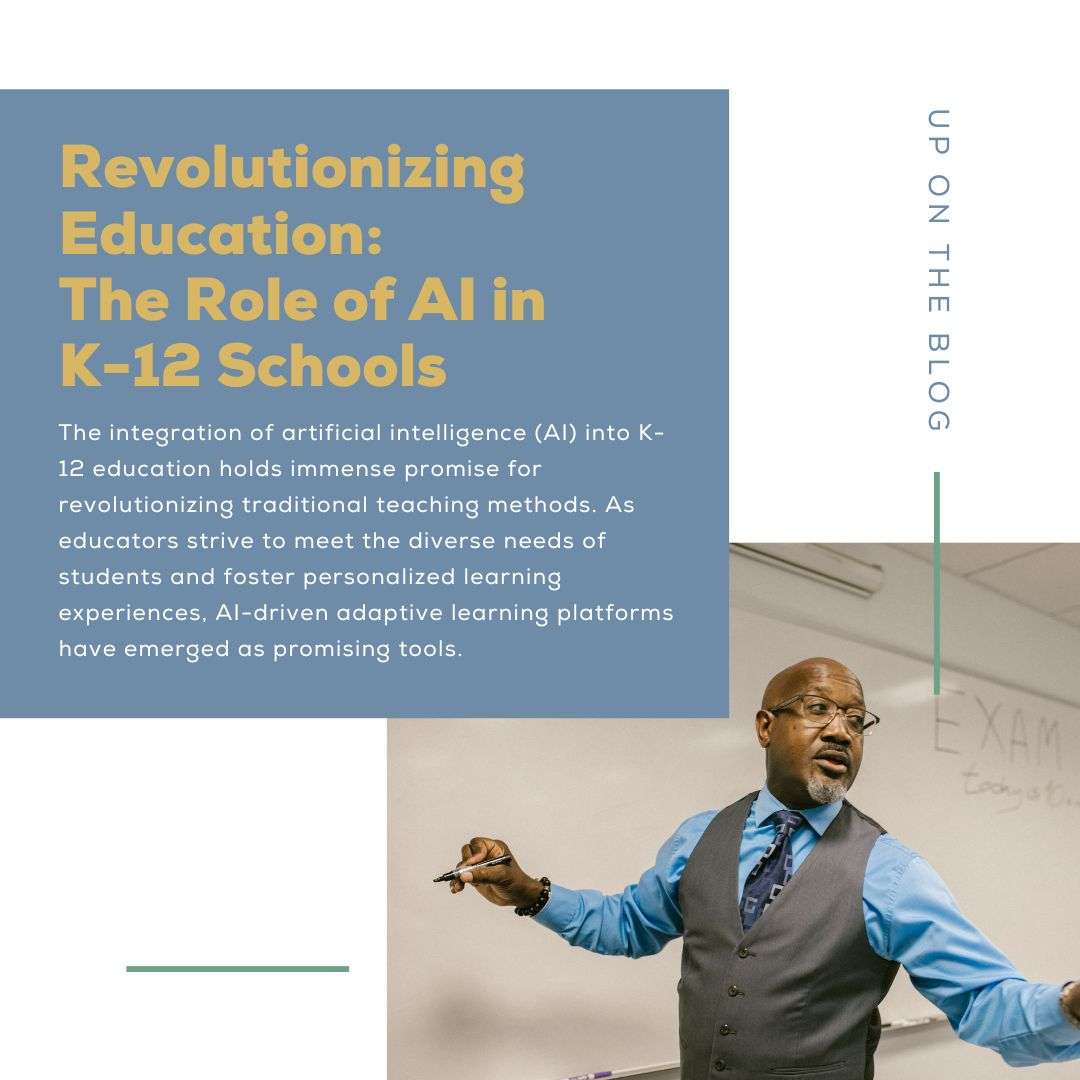In today’s fast-paced digital era, technology plays a crucial role in K-12 schools. Many educational institutions are turning to virtual Chief Information Officers (vCIOs) as a strategic resource to ensure efficient and effective management of technology resources.
Virtual CIOs bring a wealth of expertise and experience in technology planning, implementation, and management. However, you might still consider whether a virtual or in-house CIO best fits your school. Here, we’re discussing the pros and cons of enlisting a virtual CIO, and how you can best leverage this resource for the benefit of your school.
What is a virtual CIO?
A virtual CIO serves as an external consultant or service provider who takes on the responsibilities typically associated with an in-house CIO. The primary focus of a virtual CIO is to align technology strategies with the educational goals of the K-12 school, including:
- Technology Planning: Developing a comprehensive technology plan aligned with the school’s objectives and budget.
- Infrastructure Management: Overseeing the school’s technology infrastructure, including networks, servers, and devices.
- Data Security: Ensuring the implementation of robust security measures and safeguarding sensitive student and staff data.
- Vendor Management: Evaluating and managing relationships with technology vendors to ensure optimal service delivery.
- Strategic Guidance: Providing expertise and guidance in leveraging technology to enhance teaching and learning outcomes.
- Budgeting and Cost Optimization: Assisting in creating and managing technology budgets and identifying cost-saving opportunities.
- E-Rate Strategy: Developing a strategy to overcome the complexities of E-Rate funding, helping eligible U.S. schools secure funding and program discounts to obtain telecom and internet access.
Pros and Cons of a Virtual CIO
Pros of a Virtual CIO:
- Cost-effectiveness: Virtual CIOs often provide services on a contractual basis, eliminating the need for a full-time salary and benefits.
- Expertise and Experience: Virtual CIOs bring diverse experience from working with various educational institutions, which allows them to provide valuable insights and best practices that will serve your school uniquely.
- Flexibility: Virtual CIOs can adapt to the changing needs of the school, scaling their services up or down as required.
- Access to a Network: Virtual CIOs typically have a network of industry contacts, enabling them to tap into additional expertise and resources when needed.
Cons of a Virtual CIO:
- Limited On-Site Presence: Virtual CIOs may have limited physical presence, which can sometimes hinder direct interactions with staff and students.
- Potential Communication Challenges: Effective communication is crucial for technology planning and implementation. Ensuring clear lines of communication and regular updates is essential when working with a virtual CIO.
Which is Right for Your School?
Determining whether to opt for a virtual CIO or an in-house CIO depends on several factors specific to your school. Consider the following points when deciding whether your K-12 school will benefit best from a virtual or in-house CIO:
- Budget: Assess your budgetary constraints and determine if you can afford the ongoing costs associated with an in-house CIO.
- Expertise: Evaluate the current skill sets within your technology team and determine if an external virtual CIO can provide the knowledge and experience your school needs.
- Scalability: Consider the scalability of your technology needs. If your school’s technology requirements fluctuate, a virtual CIO may offer more flexibility in adapting to changing demands.
How to Leverage a Virtual CIO for Your K-12 School:
#1 Clearly Define Goals and Expectations:
Before engaging a virtual CIO, it is essential to clearly articulate the goals, challenges, and expectations for their involvement. This approach will help the virtual CIO understand your specific needs and align their strategies accordingly.
#2 Collaborative Approach:
Virtual CIOs work best when they collaborate closely with key stakeholders, including school administrators, IT staff, and educators. Encourage open communication and establish regular meetings to discuss progress, address concerns, and ensure that technology initiatives are aligned with the school’s educational objectives.
#3 Comprehensive Technology Assessment:
Leverage the expertise of a virtual CIO to conduct a thorough technology assessment of your school. This assessment will identify areas of improvement, highlight potential risks, and provide recommendations for optimizing existing systems or implementing new technologies.
#4 Strategic Planning and Implementation:
Engage the virtual CIO in developing a long-term technology roadmap that aligns with the school’s strategic objectives. Together, you can determine the appropriate technologies, budgets, and timelines required to achieve these goals. Regularly revisit and update the plan to stay ahead of technological advancements.
#5 Continuous Support and Evaluation:
Virtual CIOs provide ongoing support to ensure the successful implementation of technology initiatives. Regularly evaluate the effectiveness of implemented strategies, gather feedback from stakeholders, and make adjustments as needed. This iterative approach will allow your school to continuously improve its technology infrastructure.
In today’s digital age, K-12 schools must embrace technology to enhance teaching, learning, and administrative processes. A virtual CIO offers numerous advantages, including cost-effectiveness, expertise, strategic planning, improved efficiency, and cybersecurity. By effectively leveraging this resource, schools can navigate the complex technology landscape and provide an enhanced educational experience for students, educators, and administrators alike.
If you are looking for a virtual CIO to help enhance your school’s technology strategy and security, Technology Lab is here to help. We specialize in IT solutions for K-12 schools and our partnership INCLUDES vCIO services. Reach out to Request a Free Discovery Call to see how we can best help you and your school optimize your technology and if we’d be a good fit as a virtual CIO for your institution.


















